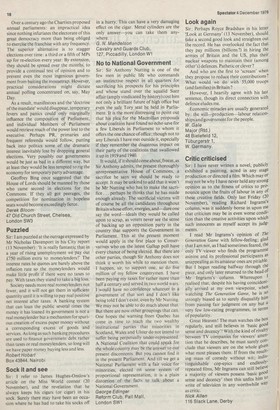No to National Government
Sir: Sir Anthony Nutting is one of the few men in public life who commands an instinctive respect in all quarters for sacrificing his prospects for his principles and whose stand over the squalid Suez affair (amply vindicated by history) cost him not only a brilliant future of high office but even the safe Tory seat he held in Parlia ment. It is the more distressing to point out that his plea for the Macmillan proposals about coalition have found no echo save for a few Liberals in Parliament to whom it offers the one chance of office; though not to any Liberals I have met outside it, especially if they remember the disastrous impact on their party of the coalitions that swallowed it up in 1919 and 1940.
It would, if it should come about, freeze, as Sir Anthony admits, the present thoroughly unrepresentative House of Commons, a sacrifice he says we should be ready to accept. It may be unkind to add that it won't be Mr Nutting who has to make the sacri fice .. . perhaps he thinks that he has made enough already. The sacrificial victims will of course be all the candidates throughout Britain whose effort, energies, and—dare one say the word—ideals they would be called upon to scrap, as voters never see the sense of backing up an opposition party in the country that supports the Government in Parliament. This at the present moment would apply in the first place to Conservatives who on the latest Gallup poll have every chance of being elected. But there are other parties, though Sir Anthony does not think it worth his while to mention them. I happen, sir, to support one, so do five million of my fellow countrymen. I have been paying my taxes for rather more than half a century and served in two world wars. I would have no confidence whatever in a government of that sort and I don't like being told I don't exist, even by Mr Nutting. We may not be able to do much about that. But there are now other groupings that can. One hopes the warning from Quebec has come in time to teach the two wealthy institutional parties that minorities in Scotland, Wales and Ulster do not intend to suffer being perpetually under-represented. A National Coalition that could speak for the whole country may be the answer to our present discontents. But you cannot find it in the present Parliament. And till we get a National Parliament with a fair voice for minorities, elected on some system of proportional representation, it is a plain distortion of the facts to talk about a National Government.
George Edinger Reform Club, Pall Mall, London SW1






































 Previous page
Previous page